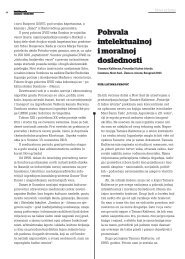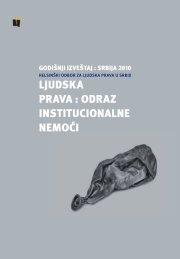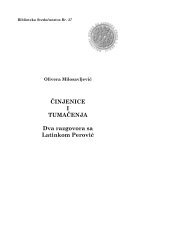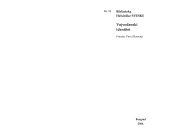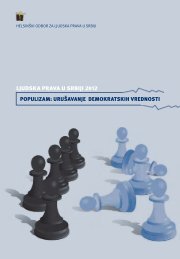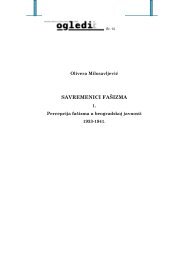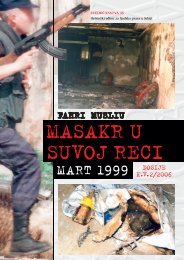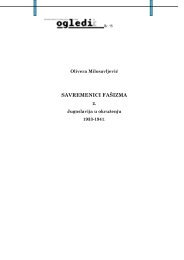Human Rights: Hostage To the State's Regression - Helsinki ...
Human Rights: Hostage To the State's Regression - Helsinki ...
Human Rights: Hostage To the State's Regression - Helsinki ...
You also want an ePaper? Increase the reach of your titles
YUMPU automatically turns print PDFs into web optimized ePapers that Google loves.
<strong>Helsinki</strong> Committee for <strong>Human</strong> <strong>Rights</strong> in Serbia<br />
attempt to discredit <strong>the</strong> tribunal in The Hague and <strong>the</strong> international law it<br />
emanates. 3<br />
Apart from <strong>the</strong> judiciary, “special services” hinder constitution of<br />
Serbia’s political scene. Hooked up with more or less tycoon-owned media,<br />
<strong>the</strong>y systematically fabricate scandals that almost never have epilogues in<br />
courts of law. This is how <strong>the</strong>y attempt to discredit not only political factors<br />
but also all “hotbeds of resistance” such as some NGOs and small political<br />
parties like <strong>the</strong> Liberal-Democratic Party, <strong>the</strong> Social Democratic Union and <strong>the</strong><br />
Civic Alliance of Serbia. Smearing campaigns in <strong>the</strong> media and earmarking of<br />
“patriotic” NGOs that closely cooperate with <strong>the</strong> regime and enjoy <strong>the</strong><br />
Church’s strong support follow in <strong>the</strong> footsteps of <strong>the</strong> fear of liberally-minded<br />
organizations and parties. As “services” are strongly backed by <strong>the</strong> Church it is<br />
only logical that <strong>the</strong> fundamentalism of <strong>the</strong> Eastern Orthodoxy resists<br />
globalization and liberalism.<br />
Kosovo is Serbia’s central issue, both domestic and foreign. And this is<br />
where anti-reformist and reformist Serbia collide again. The new Constitution<br />
was also passed in <strong>the</strong> shadow of <strong>the</strong> Kosovo question – to unify Serbia on <strong>the</strong><br />
one hand, and to seek compensation for Kosovo on <strong>the</strong> o<strong>the</strong>r. Ra<strong>the</strong>r than<br />
looking for a compromise, Serbia opted for confrontation with <strong>the</strong> US and <strong>the</strong><br />
EU, and for reliance on Russia. Serbian elites kept invoking historical right to<br />
Kosovo but what <strong>the</strong>y actually had an eye on were partition of Kosovo and<br />
access to its natural resources. The whetted confrontation with <strong>the</strong> West was<br />
only in <strong>the</strong> function of maximalist demands. What domestic elite ignores is<br />
that Kosovo was placed on <strong>the</strong> international agenda because of Serbian<br />
authorities’ misgovernment in <strong>the</strong> province throughout <strong>the</strong> 20 th century. The<br />
great majority of citizens are aware that Kosovo is a lost case but <strong>the</strong> Serbian<br />
elite still takes it can play on blackmail in <strong>the</strong> finals. All in all, <strong>the</strong> resolution of<br />
<strong>the</strong> Kosovo status can only contribute to regional stability and that’s why<br />
Ahtisaari’s plan was placed on <strong>the</strong> Security Council’s agenda. Unless <strong>the</strong> issue<br />
of status is settled nei<strong>the</strong>r Serbia nor Kosovo stand a chance for EU integration,<br />
which is crucial for <strong>the</strong>ir economic growths and mutual reconciliation, says<br />
Morton Abramowitz, former US Ambassador and member of <strong>the</strong> International<br />
Crisis Group. 4<br />
While Premier Kostunica takes <strong>the</strong> new Constitution has solved <strong>the</strong><br />
Kosovo problem, President Tadic announces, “It’s more probable that Kosovo<br />
would be independent than an autonomy within Serbia.” Never<strong>the</strong>less he<br />
insists that Serbia would never accept Kosovo’s independence. Svetozar<br />
Stojanovic, one of key strategists, says, “By comparison with <strong>the</strong> Albanian<br />
question <strong>the</strong> Serbian question exceeds Kosovo itself.” “Serbia’s significance is<br />
once again disproportionate with her actual strength,” says Stojanovic<br />
3 Milorad Ekmecic, “Power Knows No Law,” NIN, December 14, 2006.<br />
4 Newsweek International, March 18, 2007.<br />
<strong>Human</strong> <strong>Rights</strong>: <strong>Hostage</strong> <strong>To</strong> <strong>the</strong> <strong>State's</strong> <strong>Regression</strong><br />
referring to Russia’s role in <strong>the</strong> Contact Group and, above all, to special<br />
relations between Serbia and Russia. 5 According to him, <strong>the</strong> West has wasted<br />
much time on <strong>the</strong> illusion about some difference between President Tadic and<br />
Premier Kostunica – for, <strong>the</strong>re is no difference at all when it comes to<br />
patriotism. 6<br />
Centralism Slobodan Milosevic launched on <strong>the</strong> <strong>the</strong>sis of Serbia’s<br />
unity is one of Serbia’s key problems. 7 Vojislav Kostunica just continued to<br />
fortify <strong>the</strong> regime’s vertical. However, ever stronger local initiatives resist such<br />
trend. Only 42 percent of citizens of Vojvodina voted for <strong>the</strong> new Constitution<br />
that notably chokes its autonomy. The constitutional referendum also<br />
mobilized Vojvodina for <strong>the</strong> elections – <strong>the</strong> Coalition led by <strong>the</strong> Liberal<br />
Democratic Party passed <strong>the</strong> electoral threshold (won 6.1 percent of <strong>the</strong> vote)<br />
and entered <strong>the</strong> republican parliament.<br />
Though <strong>the</strong> situation in Sandzak is still delicate no major inter-ethnic<br />
incidents were registered in 2006. However, one cannot but be concerned with<br />
perpetual clashes between two key political leaders in <strong>the</strong> region and <strong>the</strong><br />
attitude of Serbian authorities and informal centers of power that<br />
instrumentalize those conflicts to slow down, obstruct and practically block<br />
major processes within <strong>the</strong> Bosniak community: firstly, <strong>the</strong> process of its<br />
integration (opened with <strong>the</strong> adoption of <strong>the</strong> term Bosniak denoting it);<br />
secondly, <strong>the</strong> process of <strong>the</strong> community’s constitution into a modern nation<br />
(which implies <strong>the</strong> establishment of an infrastructure crucial for building of<br />
national identity and articulation of its interests); and, finally, <strong>the</strong> process of<br />
<strong>the</strong> community’s overall modernization (secularization, emancipation and<br />
economic progress). Apart from hindering political actors in Sandzak to reach<br />
consensus on key issues of <strong>the</strong> Bosniak minority, <strong>the</strong> official Belgrade<br />
deliberately creates conditions for <strong>the</strong> emergence of Vehabits. With <strong>the</strong><br />
emergence of Vehabits all those processes are fur<strong>the</strong>r delayed while <strong>the</strong><br />
existing splits grow deeper and deeper and transform into religious schisms.<br />
The Islamic Religious Community is thus placed in <strong>the</strong> limelight and its<br />
activities are additionally politicized. The regime uses Vehabits and <strong>the</strong>ir<br />
public aggressiveness not only to radicalize Bosniaks’ mutually opposing<br />
political options but also to widen <strong>the</strong> gap between two major ethnic<br />
communities in <strong>the</strong> region. This indirectly fuels <strong>the</strong> prejudice about Sandzak as<br />
<strong>the</strong> region endogenously prone to various forms of radicalism (political and<br />
5 Politika, June 17, 2006.<br />
6 Politika, “Rivalry of Small Differences,” March 9, 2007.<br />
7 State borders and ethnic homogenization are singled out as Serbs’ primary<br />
interests. As it turned out in <strong>the</strong> decade of Milosevic’s rule, Serbia leans on a patriarchalauthoritarian,<br />
strongly monistic political culture <strong>the</strong> inside of which implies<br />
collectivism, egalitarianism and intolerance of differences, while <strong>the</strong> outside ethnic<br />
nationalism and warring tradition.<br />
18<br />
19



